The Russian political party “United Russia” held the first “For the Freedom of Nations” International Forum of Supporters of the Struggle Against Modern Practices of Neocolonialism on 16-17 February 2024 in Moscow. It brought together over 400 participants from more than 55 countries of Africa, Asia, the Middle East, Latin America, Europe and the CIS, representing the global majority.
From Türkiye the Vatan Party attended the forum. Vatan Party Deputy Chairman Ethem Sancak and the party’s representative in Russia, Mehmet Perinçek, who is also a United World International author, held speeches at the forum.
In his greeting to the forum participants, Russian President Vladimir Putin emphasized that the initiative to hold it was “extremely important.”
“Our country has done a lot to destroy the foundations of the colonial system and support national liberation movements. Provided young independent states with serious assistance in ensuring security, developing the economy, and solving acute social and humanitarian problems. And today we are ready to join forces in the struggle for true freedom and justice, for progress for all countries and peoples, for the formation of a democratic multipolar world order. It is based on the principles of international law, respect for each other’s legitimate interests, mutual trust and creative cooperation,” the President emphasized.
The Chairman of United Russia, Dmitry Medvedev noted that the forum participants are united by an interest in the prosperity of peoples and a caring attitude towards the fate of humanity and its full development.
“Until recently, at the instigation of the collective West, the countries of Asia, the Middle East, Africa and Latin America were arrogantly called the ‘third world’. However, today this concept has collapsed. And these countries, rapidly developing, stand for the practical implementation of the principles of sovereign equality of states and civilizational diversity, for a complete rejection of manifestations of neo-colonialism,” he said.
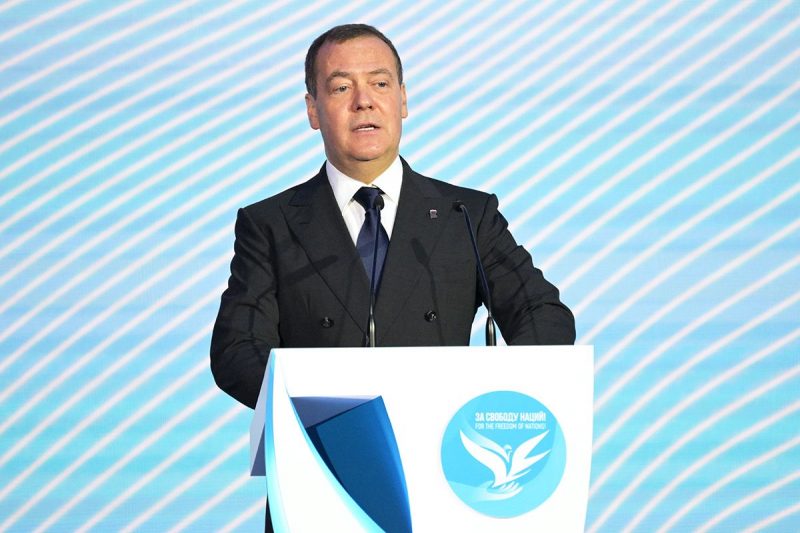
Dmitry Medvedev cited the situation in Ukraine as an example of the irresponsible behavior of the West. According to him, it serves as a blind weapon in the hands of the collective West against Russia.
“That is why we are conducting a special military operation – to protect our national interests and the citizens of our country. This is what any sovereign, independent and self-respecting state does – fully in accordance with the UN Charter,” said the Chairman of the party.
He also drew attention to the fact that the West is trying to pacify opponents of the far-fetched laws of the world minority with sanctions. But the attempts of a separate group of countries to establish a world monopoly are doomed, and the era of the unipolar world order is over, Dmitry Medvedev is sure.
“Our parties must work together to counter neocolonial practices and create an agenda of positive cooperation for the long term. In addition, our parties could give serious impetus to the formation of an ‘anti-sanctions coalition’. Including the development of international legal documents that provide for the refusal of the participants of this coalition to apply neocolonial restrictions imposed against them by third countries,” said the Chairman of United Russia.
He also proposed to consider at the UN General Assembly the possibility of establishing a Day of Remembrance for the Victims of Colonialism on December 14, the date of the adoption in 1960 of the Declaration on the Granting of Independence to Colonial Countries and Peoples. And also – to systematize information about the crimes committed during the colonial period, to begin an objective assessment of the damage they caused.
In addition, an international socio-political movement of responsible supporters of the fight against the practices of neocolonialism is being created at the forum.
“The movement is designed to help ensure reliable, indivisible security, global stability, justice, adherence to the principle of non-interference in the affairs of other countries, respect for their cultural and civilizational identity. Our goal is to put an end to the right of the so-called ‘chosen’ countries to determine the course of history and decide the destinies of the peoples of the world,” said Dmitry Medvedev.
As Foreign Minister Sergei Lavrov recalled, Russia has previously been a leader in promoting decolonization processes. And now the forum “For the Freedom of Nations!” important for eradicating neocolonial practices. To uphold justice and the norms of the UN Charter, United Russia also created the Club of Friends of Russia.
“We propose to develop common approaches of the world majority to understanding neocolonialism, to complete the decolonization work begun by Soviet diplomacy at the UN. There are still 17 territories under colonial rule. The time has come to join forces and begin systematic work to eradicate neocolonial practices,” said Sergei Lavrov.
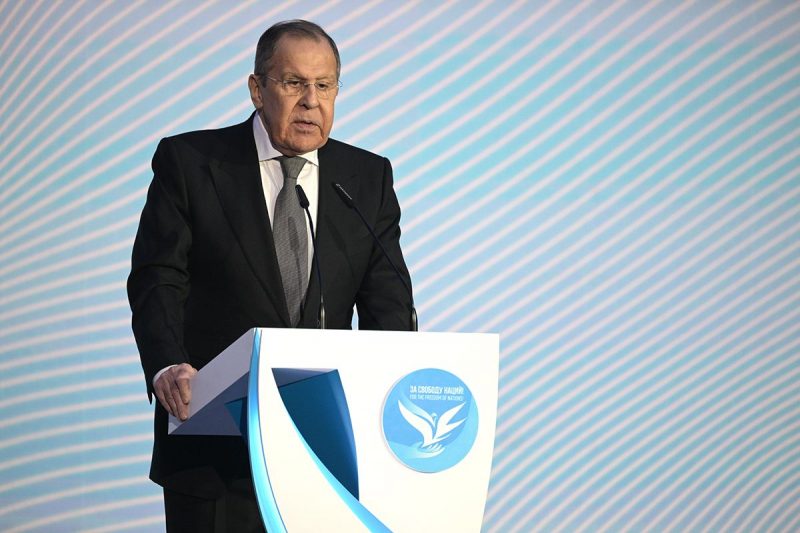
“We understand perfectly well how modern practices of neocolonialism now hinder our countries from developing, and how much international solidarity is needed. I would like the international movement ‘For the Freedom of Nations!’ became an organization that would work on a permanent basis,” emphasized the President of the Central African Republic, Faustin Archange Touadera.
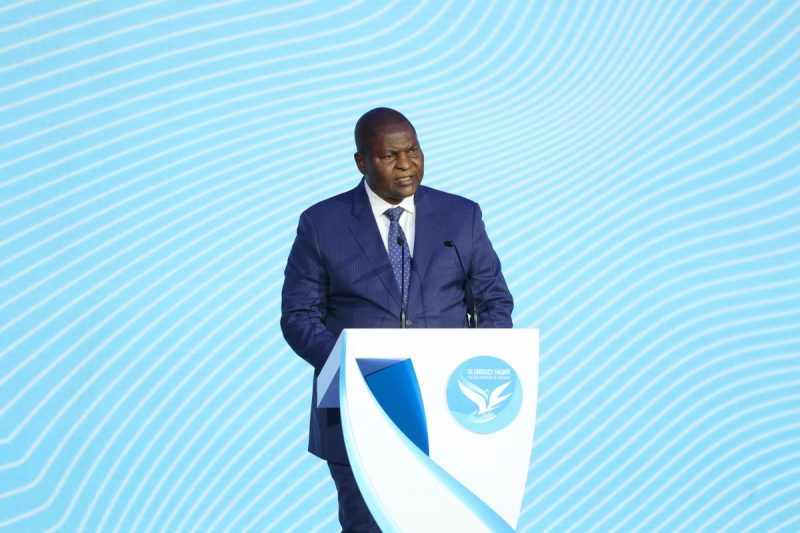
The head of the international department of the Central Committee of the Communist Party of China, Liu Jianchao, noted that the forum reflects the desire of the participating countries for a multipolar world, development and cooperation.
“It is necessary to jointly defend the right of all countries to development and prosperity, to promote the development of globalization in a more accessible direction. Defend peace and stability throughout the world, categorically oppose hegemony in all its manifestations,” said Liu Jianchao.
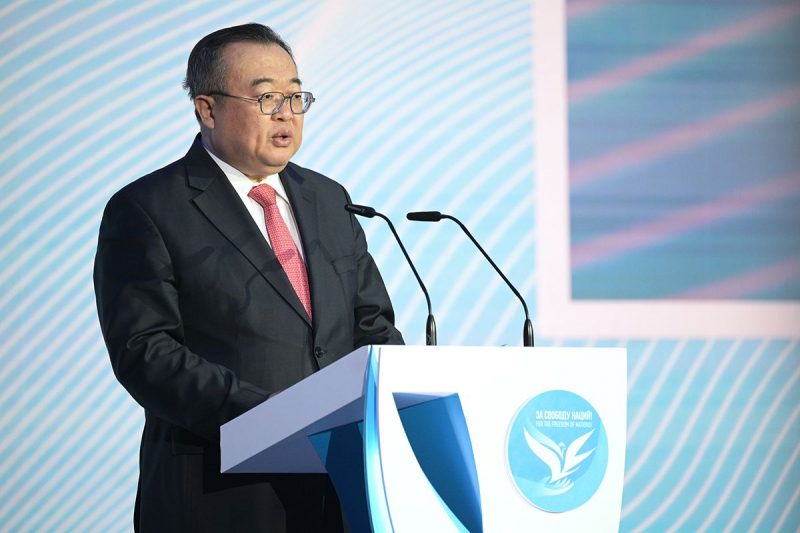
The importance of countering neocolonialism was emphasized by all forum participants.
“Our meeting is the starting point for future joint, multifaceted work. I am confident that responsible political parties that represent the interests of the world majority will play a key role in the fight against the practices of neocolonialism,” concluded Dmitry Medvedev.
Participants of the international forum “For the Freedom of Nations!” also adopted the final statement:
FINAL STATEMENT OF THE PARTICIPANTS OF THE FORUM OF SUPPORTERS OF THE STRUGGLE AGAINST MODERN PRACTICES OF NEOCOLONIALISM
We, the participants of the Forum of Supporters of the Struggle against Modern Practices of Neocolonialism, the representatives of political parties and public organizations,
– building on the close ties, relations of friendship, cooperation, and mutual respect between the peoples of our countries, a common history of striving to achieve genuine independence and freedom, as well as counteracting destructive practices of colonialism,
– committed to building a fair and equitable multipolar world order with the central role of the Charter of the United Nations (UN) and other universally accepted norms of international law, based on the principles of equality and sovereignty, non-interference in the internal affairs of states, indivisible security, and respect for cultural and civilizational identity,
– noting that a significant number of countries in Asia, Africa, and Latin America, bearing the heavy burden of the consequences of colonial dependence, have not yet fully recovered from the damage caused to them,
– recognizing that the exploitation of the peoples of the world continues through neocolonial manifestations aimed at limiting the sovereignty of other countries in domestic and foreign policy, economic, ideological and other spheres while maintaining the formal attitudes of their independence,
– noting that the States affected by colonial and neocolonial practices constitute the World Majority,
– welcoming the contribution of the UN in the struggle against colonialism and its contemporary manifestations through resolution A/RES/15/1514 (XV) of December 14th, 1960, on the approval of the Declaration on the Granting of Independence to Colonial Countries and Peoples and the annual draft resolutions on the “Implementation of the Declaration on the Granting of Independence to Colonial Countries and Peoples” and acting within the framework of resolution A/RES/75/123 of December 21st, 2020, on the Fourth International Decade for the Eradication of Colonialism (2021-2030),
– noting the high demand for joint efforts to improve the efficiency of the relevant UN mechanisms to counter the colonial legacy (UN Special Committee on Decolonization and UN Special Political and Decolonization Committee),
– stressing that the struggle against neocolonialism is not directed against any specific State or international organization and is aimed at fomenting constructive dialogue on issues of countering modern neocolonial practices, i.a. manufactured separation of the economies of different states, restraining their economic development and scientific and technological progress, undermining economic cooperation between developing nations,
– noting the high demand for enhancing international programmes of cultural and humanitarian cooperation,
– reaffirming the importance of establishing more efficient regular channels of interaction between the peoples of our countries to develop common approaches to key issues on the international and regional agenda and to coordinate efforts to combat neocolonial practices,
have agreed as follows:
1. To enhance international inter-party cooperation and to actively use public diplomacy in order to strengthen and deepen political, economic, social, and humanitarian ties between our States with the aim of consolidating the countries of the World Majority in promoting full and effective compliance with the purposes and principles of the UN Charter and in countering modern practices of neocolonialism that undermine the sovereignty of States.
2. Counteract the selective application of universal norms of international law and the promotion of the concept of a “rules-based world order” (imposing certain standards on the World Majority, in the development of which the equal participation of all interested states was not ensured).
3. To consider within the framework of the UN General Assembly the possibility of establishing the Day of Remembrance for the Victims of Colonialism (December 14th) in order to preserve the memory of this tragic page in the history of the humankind and preventing similar occurrences in the future.
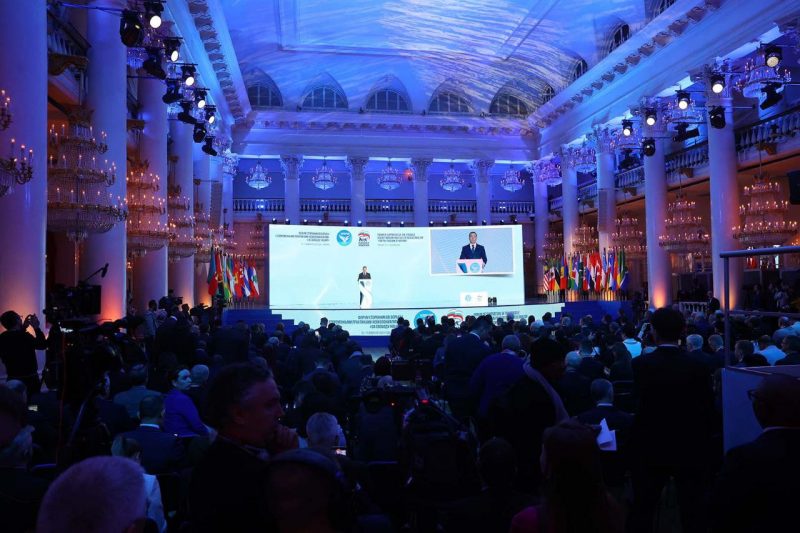
4. To strongly condemn the gross and illegal practices of interference in the internal affairs of the countries of the world and to remain committed to UN General Assembly Resolution A/RES/20/2131 of December 21st, 1965, on the approval of the Declaration on the Inadmissibility of Intervention in the Domestic Affairs of States and the Protection of Their Independence and Sovereignty.
5. To focus the attention of the world community on the inextricable cause-and-effect connection between the crimes of colonialism and neocolonialism and the increasing inequality in the modern world, as well as the problems of poverty and hunger in developing countries. The Forum expresses solidarity with the Palestinian people, who are effectively deprived of the right to self-determination, independence, sovereignty and peace, guaranteed to them by decisions of the UN Security Council.
6. To oppose the falsification of history and any attempts to erase from the collective memory the facts of the heinous crimes of colonialism, including genocide, mass ethnic cleansing, illegal transfers of objects of cultural heritage, slave trade, racism, as well as other similar practices of violation of universally recognized rights and freedoms.
7. To initiate an assessment of the material and non-material damage inflicted by the former metropolises, including its negative consequences for the socio-economic and humanitarian development of the affected states. To call on stakeholders to ensure the free access to relevant archives, including for the purpose of ensuring accountability and publicizing the atrocities of colonialism.
8. To counter, i.a. on international platforms, the practices of economic blackmail, carried out through the introduction of unilateral coercive restrictive measures, including secondary sanctions, in violation of the UN Charter and other norms of international law, in particular, the blockade that has lasted more than 60 years carried out by the United States against Cuba.
9. To intensify joint efforts to ensure long-term food security of the countries of the World Majority through efficient market regulation, including countering politically motivated restrictions on food supplies.
10. To coordinate approaches to financial security of developing countries, taking into account the need for a full reform of the International Monetary Fund (IMF) system, including the quota distribution mechanism, as well as the World Bank system, including the capital share distribution mechanism. To promote the expansion of the activities of multilateral development banks in order to increase the scale of assistance to the countries of the World Majority in achieving the Sustainable Development Goals (SDGs).
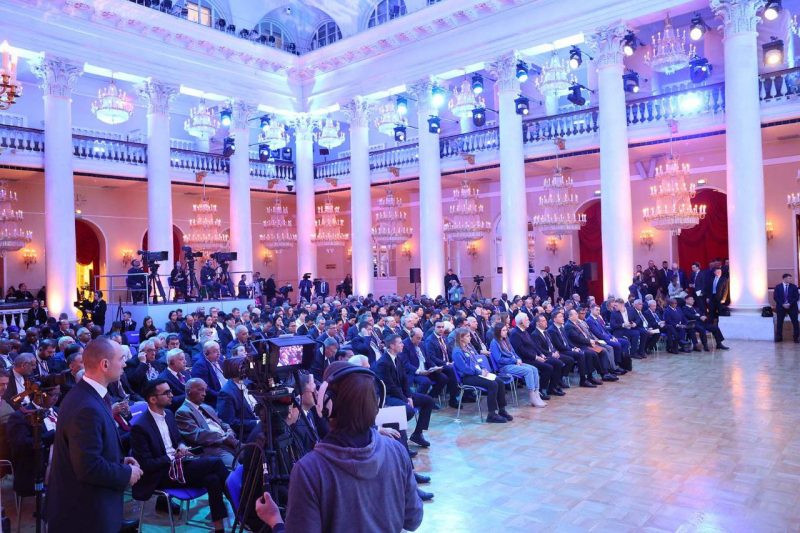
11. To counteract the imposition of neocolonial instruments of external monetary and financial controls, to promote the diversification of the international monetary system by encouraging the use of national currencies in global trade and financial transactions.
12. To defend the right to energy sovereignty and equitable development of the countries of the World Majority, i.a. in compliance with the principles and provisions of the 1992 UN Framework Convention of Climate Change and the 2015 Paris Agreement regarding common but differentiated responsibilities. As part of the fight against “carbon neocolonialism,” call on developed countries to achieve the required level of financial assistance for the climate agenda (USD 100 billion per year until 2025) to ensure the right of the countries of the Global South to equitable development.
13. Taking into account the increasing role of information and communication technologies, to promote active exchange of experience and knowledge. To counteract the destructive methods used in this area, i.a. the politicization of information and communication technologies, the artificial split of the global Internet, information and psychological campaigns, and cyberattacks used to limit the sovereignty of developing States. To coordinate efforts in the struggle against “digital neocolonialism” to ensure equal access of all States of the world to the global information space. In this context, to support the activities of the Open- ended Working Group on security of and in the use of information and communication technologies.
14. To capitalize on the positive aspects of globalization to encourage equal mutual enrichment of national cultures through multilateral humanitarian cooperation, including intercivilizational and interfaith dialogue.
15. To continue joint efforts, i.a. on international platforms, to counteract “cultural neocolonialism”, which weakens national identity, threatens the civilizational identity, centuries-old traditions and spiritual and moral values of the countries of the World Majority.
16. To counteract any manifestations of aggressive nationalism, neo- Nazism, racism and xenophobia, discrimination on the basis of religion, belief or origin, including related intolerance towards migrants, refugees, and asylum seekers, encouraged systematically in certain States of the world.
17. Building on the long-standing traditions of friendship, equal and comprehensive cooperation between our countries, to continue dialogue on issues related to countering modern practices of neocolonialism in the framework of subsequent meetings. In this regard, to establish a worldwide informal Movement – Forum of Supporters of the Struggle against Modern Practices of Neocolonialism (short name – “For the Freedom of Nations!”) and to hold events within the framework of this Movement at least once every two years.
18. To transform the International Organizing Committee of the Forum into the Standing Committee of the Forum of Supporters of the Struggle against Modern Practices of Neocolonialism in order to coordinate the work of the Movement.
_____________________







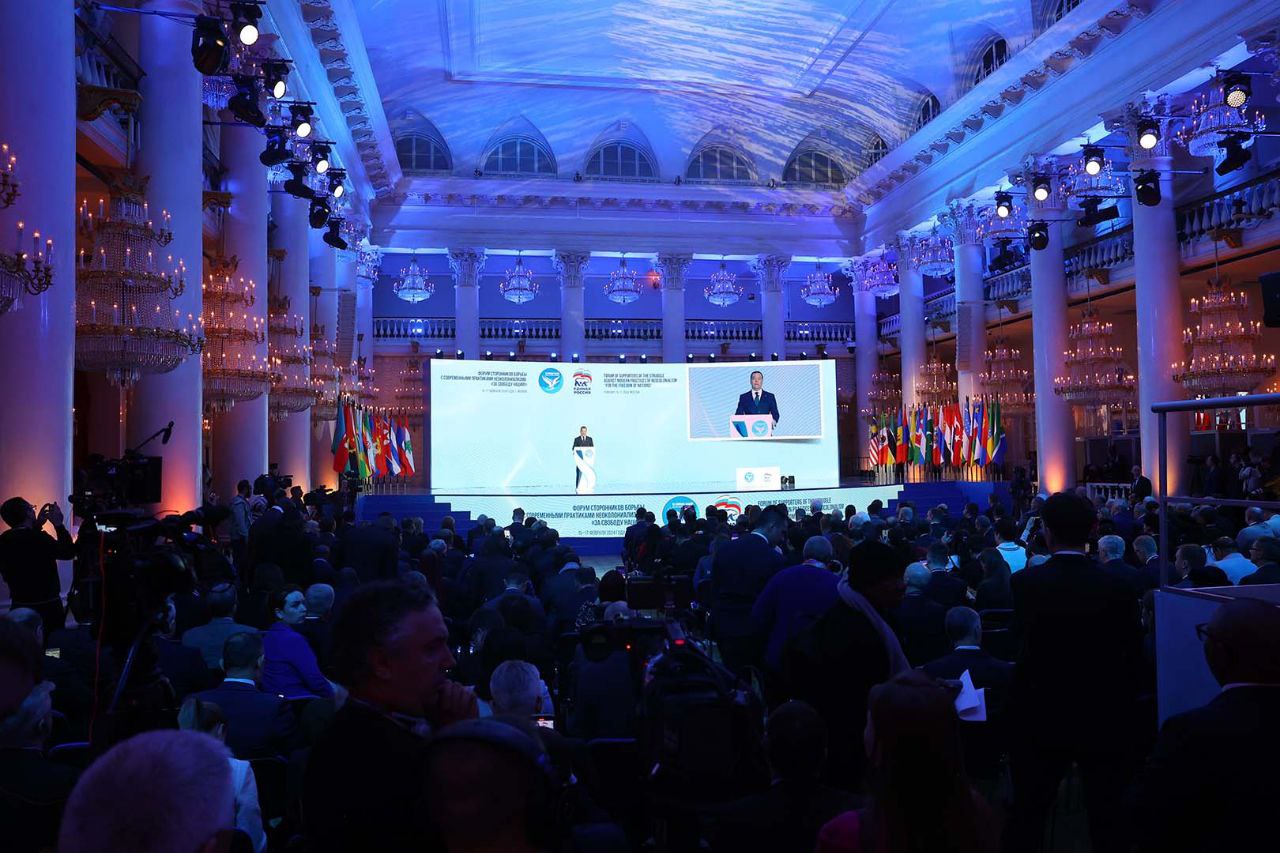









Leave a Reply